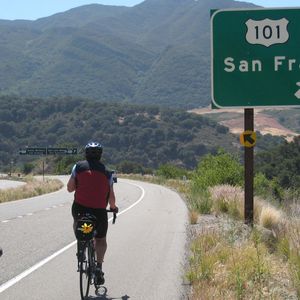Who she was: A famed British journalist who was a (reasonably) out lesbian when that wasn’t easy — and even inspired a popular song.
What she accomplished: Nancy Spain was a multimedia celebrity of the 1950s and early ‘60s: reporter and columnist for British tabloids, author of campy detective novels, and a TV personality on game and talk shows. She dressed in what was described as “natty gents’ sportswear” and lived with a woman, magazine editor-publisher Joan Werner Laurie, and while Spain’s lesbian identity wasn’t publicly discussed, it was fairly obvious. “Some people thought her merely bohemian, but others recognised the dress-code and were grateful to have so engaging a role-model,” Peter Parker wrote in London’s Independent in 1997, in a review of Rose Collis’s biography of Spain, A Trouser-Wearing Character: The Life and Times of Nancy Spain.
“One of the pleasures of Spain’s story is that of witnessing someone getting away with it,” Parker added. “Not only did this person, who would these days be described as a ‘visible lesbian,’ have a large gay following (particularly for her decidedly camp detective stories), but she was read and listened to by thousands of ordinary heterosexual pre-feminist women.” Through her articles and TV appearances, “such women could learn what it might be like to work a dockland crane, go rock-climbing or rally-driving,” he wrote. “With a certain amount of discretion she even wrote about her own domestic set-up with ‘a very nice lady publisher (i.e Laurie) and her two sons.’ Readers were not, of course, informed that the two women shared a bed.” Reportedly, a few other people shared Spain’s bed; Collis says Marlene Dietrich and Lena Horne were among them. But her relationship with Laurie endured.
Spain had a forceful personality, which did not sit well with everyone, but which her publishers capitalized on. The Daily Express promoted her by saying, “They call her vulgar ... they call her unscrupulous ... they call her the worst dressed woman in Britain.” She joined News of the World in 1961, and its promotional copy can be read with a different understanding today: “She’s gay ... she’s provocative ... she’s going places.”
Spain died, however, just three years later, in a plane crash that claimed Laurie’s life as well. Spain was only 47. Friend and admirer Noël Coward commented on her death as only he could: “It is cruel that all that gaiety, intelligence and vitality should be snuffed out, when so many bores and horrors are left living.”
Years after her death, Spain’s name gained a new sort of fame. Irish singer-songwriter Barney Rushe liked the sound of her name, and he used it as the title of a love ballad he wrote — about a very different woman woman. Famed Irish troubadour Christy Moore heard Rushe play it at a club in 1969 and loved it. Moore made a hit record of it in 1976, and many others have performed and recorded it as well.
The real Nancy Spain deserves a song of her own, observed Declan Moore in an article for the Irish Independent (a separate paper from the London one). “So singular was the life and work of the real Nancy Spain,” he wrote this year, “it would provide many verses for a ballad, entitled, perhaps, Nancy Spain ... except that, of course, is taken.”
For more information: Read the London Independent article here and the Irish Independent one here. It’s still possible to find copies of Collis’s biography, at Amazon and other sources, and Collis’s website says a Kindle edition will be available soon. Spain is one of the people Collis portrays in her one-woman show Trouser-Wearing Characters, which she has performed in the U.K., Australia, and New Zealand. And below, watch Christy Moore perform the song to which her name is attached.























































































































ANOTHER gay adult star gets POUNDED after coming out as a Trumper